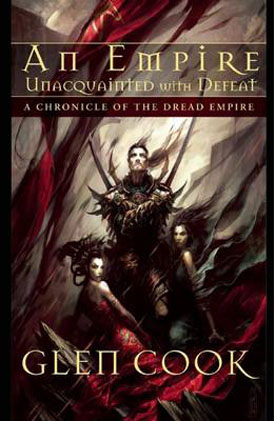 “Before the Instrumentalities of the Night, before the Black Company, there was the Dread Empire. . . .” So declares the jacket flap on this collection of Glen Cook’s short fiction, all set in the universe of Shinshan, Kavelin, Itaskia, and Hamad al Nakir.
“Before the Instrumentalities of the Night, before the Black Company, there was the Dread Empire. . . .” So declares the jacket flap on this collection of Glen Cook’s short fiction, all set in the universe of Shinshan, Kavelin, Itaskia, and Hamad al Nakir.
It’s true.
It’s hard to remember after all this time (I’ve been reading Glen Cook’s work for roughly three decades, give or take), but I’m pretty sure the Dread Empire series was my first encounter. The titles of the novels are themselves evocative: A Shadow of All Night Falling, October’s Baby, All Darkness Met, and their successors. The books themselves are equally so, and I was hooked, although Cook’s stories can be disquieting. This is not the “Heigh, ho! Here we go!” sort of heroic fantasy in which the heroes may face dire dangers but we, the readers, are assured of their eventual triumph — those are the rules, after all. Or they were.
In Cook’s vision, the heroes, such as they are, are as likely to get screwed as anything else.
This collection roams over the Dread Empire universe, beginning with a novella about Tain, a “Solider of an Empire Unacquainted with Defeat.” The wars are over, the empire is eating itself, and Tain is tired of it. He heads west, as far west as he can go, and there encounters a boy, a family, and an unacceptable situation. He winds up involved in the plight of poor sheepherders on the borderlands, quite in spite of himself.
There are several threads running through these stories, and this is one of them. Call it “re-finding humanity.” Tain, and even more so Bowman and the crew of the Vengeful Dragon — men somewhere between the Flying Dutchman and your worst nightmare — begin to change, begin to realize that dealing death is not the only way to live. (The three stories about that notorious pirate ship are the darkest in the book, and among the darkest of Cook’s career. It’s only later that you realize that the blackness was not absolute.)
And there’s a full measure of tricky, a Cook trademark, perhaps best shown in two stories about Bragi Ragnarson, a name that will be remembered by those who’ve read the novels. Both “Nights of Dreadful Silence” and “The Castle of Tears” involve wizards, in Cook’s universes generally not the most trustworthy characters. A man needs all his wits to deal with them.
There’s also an element of retribution, brought home in “Severed Heads” — Narriman is not happy about bearing a child to a shagûn (she wasn’t a willing participant), and is even less happy when the child’s father shows up and abducts him. Like so many of Cook’s protagonists, she demonstrates that there are some people you just don’t want to mess with.
It’s not all darkness. Cook has drawn on Norwegian folklore for two stories, “Finding Svale’s Daughter” and “Silverheels,” in a much lighter vein. There are parts of Norway — or in this version, Trolledyngja — where mere mortals are at a disadvantage. Unless they can find the right allies.
One of the big appeals of this volume, in addition to the stories themselves, is the way they are told. Someone referred to Cook’s “war-correspondent prose,” and I can’t think of a more apt description, but perhaps it doesn’t go far enough. The style is generally direct and unadorned, with a first-hand quality that’s hard to beat, but it’s never in any way repetitive or mechanical. The man is a master stylist — he doesn’t let you go. He’s become my literary equivalent to Beethoven: I can read him anytime.
If you’ve read the Dread Empire novels, these stories will be a welcome tickle to the memory. If not, they’ll be a good introduction. But be warned: they’re addictive.
(Night Shade Books, 2009)
